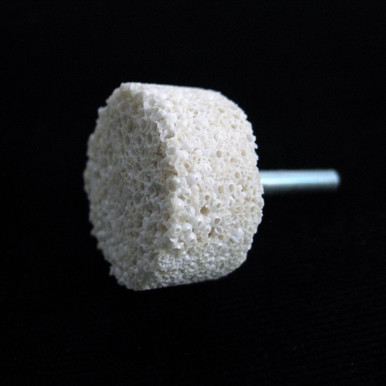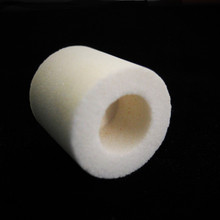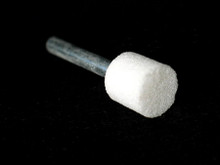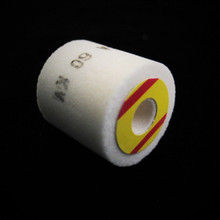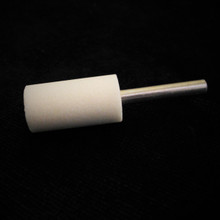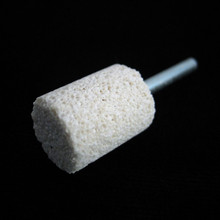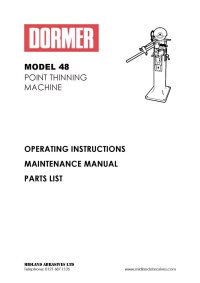- Home
- Products
- Mounted Wheels & Points
- Type 'W' Shaped Mounted Points
- (W237a) 40 x 20/6 x 40 WA POROUS (MP117) for Rubber
Product Description
|
Mounted Point - W237a - 40 x 20/6 x 40 Shank.
Specially developed using a soft bond with 'D' hardness & a very open '12' Structure. Recommended speed - 5,000 RPM, Maximum permitted speed - 23,800 RPM Mounted Points in hardness D are manufactured from a special vitrified bond with bubble grain aluminium oxide.The low bond volume in combination with the easy-to-break-down bubble grain produces the softest mounted points in our product range. The hardness D is particularly suitable for work on soft materials such as plastic, rubber and wood, and is characterized by its high abrasiveness.
ADVANTAGES :
APPLICATION EXAMPLES:
RECOMMENDATIONS FOR USE :
|
|
|
Difficulties with rubber grinding Due to the clogging of rubber on the grinding face, rubber grinding is proven to be one of the hardest processes for experienced engineers. With the friction that is generated from rubber on rubber contact and the poor thermal conductivity of rubber, excessive heat is generated whilst grinding. If the wheel is not dressed regularly this excessive heat can lead to wheel cracks and breakage. This problem is most acute whilst using vitrified grinding wheels on soft rubbers. Hard Rubbers In general rubber grinding is easier the harder the rubber is, for example, ebonite can be quite easily ground with a conventionally structured vitrified wheel (although not ideally recommended due to the thermal shock thats created). For hard rubbers (80 - 90 shore A) a resin bonded wheel would be recommended. This softer resinoid type wheel should be the only product a wheel manufacturer should offer as a starting point for unproven grinding configurations. Always request a manufacturers wheel specification based upon the rubbers' material data spec. A good starting point for grinding hard rubbers would be C46 K7B (C = Silicon Carbide, 46 = Grit size, K = Hardness of wheel, 7 = Porosity (The higher the number the larger the porosit), B = Resinoid Bonded). |
|
|
Soft Rubbers Softer rubbers commonly used on printing rolls present the greatest difficulty for the experienced engineer. The materials tend to be inherently tacky and extremely elastic. This tackiness clogs the wheel very rapidly leading to excessive heat generation.Typical materials of this type include Nitrile, Nitrile PVC, EPDM, Chloroprene (Neoprene), Chlorosulfonated polyethylene rubber (Hypalon), Polyurethane rubber etc. Hardness for these type of materials can vary from 20 - 70 Shore A. Starting point for the safest and most effective way to grind these particular rubbers is to start with a resin bonded buble alumina wheel. The porosity of the wheel allows the wheel to cut without clogging - also allows heat dissipation. A good starting recommendation for rough grinding soft rubbers would be WA24 K7B (WA = White Aluminium Oxide, 24 = Grit size, K = Hardness of wheel, 7 = Porosity (The higher the number the larger the porosit), B = Resinoid Bonded). A good starting recommendation for finish grinding soft rubbers would be WA60 K7B (WA = White Aluminium Oxide, 60 = Grit size, K = Hardness of wheel, 7 = Porosity (The higher the number the larger the porosit), B = Resinoid Bonded). |
|
On Site machining facilities available. We can modify standard stock to your specifications. Please contact the office on: +44(0)121 687 1135 |
 Loading... Please wait...
Loading... Please wait...




































